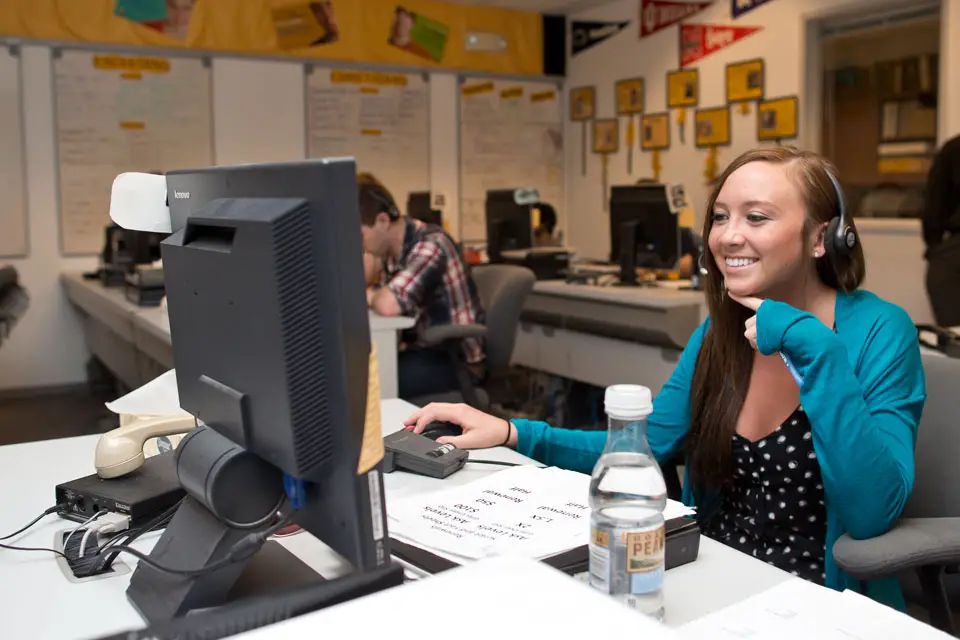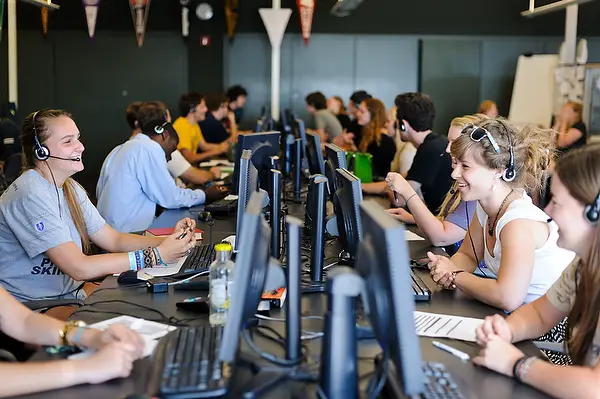The Call of the Telefund
Calling thousands of alumni has given me a vision of my post-grad future, as well as some surprisingly good advice.
By Michelle Hy, Portland State University
“Hi, my name’s Michelle and I’m a student at [insert alma mater here]. How are you doing this evening?”
When I applied to be a caller for my university’s telefund, I wasn’t expecting much. The position had a high turnover rate and involved asking people, most of whom were still paying back student loans, for their hard-earned money.
 However, the job was conveniently on campus, worked around my class schedule and while every caller had a quota to meet, the student-run management weren’t heartless sharks about it. Beggars can’t be choosers, especially with U.S. student loan debt shooting past even credit card debt. I knew for a while that I’d be busking for money in one form or another.
However, the job was conveniently on campus, worked around my class schedule and while every caller had a quota to meet, the student-run management weren’t heartless sharks about it. Beggars can’t be choosers, especially with U.S. student loan debt shooting past even credit card debt. I knew for a while that I’d be busking for money in one form or another.
However, as mindless as the work mostly was, I can’t say that it was completely worthless. Wearing that headset was like holding a stethoscope to my ear and hearing the beat of generations that have been where I have been. Asking people for money became the side gig. Listening to people’s stories was why I came to shift each evening.
I came to call it the “collective alumni mind,” and in my 18 months at the telefund, these are some of the lessons it has taught me.
Experiment
Most students want to get in and get out as efficiently as possible, so that they can at least enjoy the last few years of their life without debt. Oftentimes, the time and resources to experiment just aren’t available, but if there’s any way to procure some wiggle room, you need to occupy that space unapologetically.
Alumni love giving this advice because they either attribute their success to having had the time to find out what worked for them, or they’re lukewarm about their current situation and regret not having tried something different when they were younger.
Until I took an Introduction to Applied Linguistics class, I spent two and a half years loathing every other minute of majoring in computer science.
I dropped all my computer science classes that term and switched majors and I haven’t regretted it since.
Take advantage of electives, talk to your counselor, and go to major and career fairs. You can’t know what you want if you don’t know what’s out there.
Your Major Doesn’t Matter
Engineering and the hard sciences aside, the major you choose isn’t as important as you’re led to think it is.
Based on the calls I’ve had, the number of alumni working in the field they majored in is significantly outnumbered by the number of alumni doing something completely different. I’ve talked to education graduates who are graphic designers, anthropology majors who became human resource managers, and dance students who ended up as programmers.
What many employers want to see is that you had the discipline and follow-through to complete a four-year degree, and that you have applicable skills to get the job done.
More often than not, skills and concepts you learn in one field can be massaged to apply to another. People might have laughed at you for getting an English degree, but you can write the hell out of a report and skim for important information from a document twice as fast as your peers. No degree is completely useless.
Don’t Do Something You Hate
It should come as no surprise that at least every other alumni that I spoke with had no interest in donating, whether they were actively upset with the university or they had simply long moved on. Surprisingly, however, even a handful of these seemingly jaded cynics could stand behind the old cliché of “following your dreams.” As a student about to enter year six of a seemingly endless undergraduate education, even I find it hard to stay that optimistic. The collective alumni mind came up with a more nuanced version. Specifically, they took into account that sheer passion and delusions of grandeur are not recognized at most grocery stores and utility companies as legal tender. However, it’s hard to sustain a 40-year career doing something you absolutely despise, even if it pays well. Your happiness and well being are top priority and as long as you’re getting your basic needs met, it’s absolutely all right to take a pay cut if that means you’ll be a lot less miserable.
The collective alumni mind came up with a more nuanced version. Specifically, they took into account that sheer passion and delusions of grandeur are not recognized at most grocery stores and utility companies as legal tender. However, it’s hard to sustain a 40-year career doing something you absolutely despise, even if it pays well. Your happiness and well being are top priority and as long as you’re getting your basic needs met, it’s absolutely all right to take a pay cut if that means you’ll be a lot less miserable.
Besides, work doesn’t have to be your life. There’s plenty of opportunity to pursue your interests outside the office.
Everything’s Going to be Okay
One of the hardest calls to take involve alumni who are kind, but are in no position to give. As a student living more or less paycheck to paycheck, I could empathize. But what really made these calls difficult was the prospect that these alumni serve as a potential mirror into my future, one in which I’m still struggling to make ends meet.
Staring at that reflection, my mind begins to spiral downward, questioning whether or not I’ve been making the right academic choices, if I’m adequately networking or if I’ve been making myself marketable enough.
However, no matter how irrelevant their degrees were or if they were unemployed, each and every alumnus I spoke to was doing just fine. Listening to these students of life, I was exposed to the way hundreds of people have coped with life after college. And in their resilience, I saw my own.
I currently work part-time in retail, have a lackluster GPA and I don’t even know where to begin to line up job prospects for myself after I graduate. And it’s all okay. Failure doesn’t lie in my lack of direction, but in the expectation that people my age with meager real world experience should already have their life figured out for the next several decades. Silly at best, debilitating at worst, this narrative is in need of a major rewrite.









